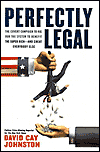|
Since Nelson and I have both been grousing
about Mac OS X's Terminal.app, I did some more research.
Command-doubleclick will open an URL in Terminal.app, but only if the
URL is one line long. Here's a better solution:
Update: I updated the suggested "word" line after finding a few holes and resorting to reading RFC 2396. I omitted '!', "'", "(", and ")" because I think those would cause more parse errors than they would solve in this context.
One of the fun things we did in Germany is take a short
excursion on the
Harzer Schmalspur Bahn, a narrow
gauge railroad running through the
Harz
Mountains.
The
tourist
train is an hour and a half run up to
Brocken,
the highest point in the Harz mountains. The fun thing is you get to
take one of their restored steam
trains. It's not often you see a fleet of 25 steam trains working
every day. Other
tourists
liked the trains, too.
HSB GmbH seems quite serious.
It's not just a tourist rail - it's also the most direct
route through
the Harz mountains, Deutsche Bahn doesn't serve it. The mountains are
beautiful, full of
hiking trails and forests.
Today is Gay Pride in SF.
While I'm not much for the throngs downtown, I do have one
thing I'm gay proud of.
  Wow, the new
Bush/Hitler ad
(WMV)
is brilliant propaganda.
The overt message is to discredit
moveon.org and the Democrats by
claiming they improperly compare Bush to Hitler. But the ad happily
uses the juxtaposition of Hitler with
images of Gore, Dean, Gephardt, Kerry to implicitly connect the
Democrats to Nazis.
It's like Karl Rove was
taking notes when he watched
Oliver Stone's JFK.
Wow, the new
Bush/Hitler ad
(WMV)
is brilliant propaganda.
The overt message is to discredit
moveon.org and the Democrats by
claiming they improperly compare Bush to Hitler. But the ad happily
uses the juxtaposition of Hitler with
images of Gore, Dean, Gephardt, Kerry to implicitly connect the
Democrats to Nazis.
It's like Karl Rove was
taking notes when he watched
Oliver Stone's JFK.
The ad also neuters the appropriate outrage of the Democrats. Frankly, this is the time for pessimism and rage. But the ad turns that on its head. Mean ol' Kerry, wouldn't you rather vote for nice piano music Bush? And showing this video only on the web bypasses all sorts of pesky campaign laws. Because of the Hitler controversy this ad is now all over the mainstream media. It may be hypocritical, but it sure works.
I got a Mac laptop (12" powerbook), thought I'd try something different.
Unix with a non-X interface, you have to like that. My favourite thing
is the beautiful font renderer.
I asked some friends - Cory, Evan, Jason, Eric, and Raffi - for advice on what to install to make my Mac happy. Things I've found useful so far:
I just got a Mac laptop and turned it on to go through the setup
wizard for the first time. What is with this thing? It's asking me for
my mailing address, the size of company I work for, what industry I'm
in. And I have to answer these intrusive questions before I get
to use the computer I bought: there's no opt-out, no "skip this
question".
Isn't Apple supposed to be the friendly computer?  I may be three years behind the times, but
The Fast and the
Furious is a pretty great movie. Cool cars, tight editing, and the
kind of After School Special for Adults plot I love in action movies.
I may be three years behind the times, but
The Fast and the
Furious is a pretty great movie. Cool cars, tight editing, and the
kind of After School Special for Adults plot I love in action movies.
I'm impressed with Vin Diesel, too. I like action movie stars who do what they do well. His new Riddick Xbox game is great, does the video game tie-in better than anyone so far. Smart move forming Tigon Studios, his own game company. Maybe one day Vin will be governor.
Dresden was the
most surprising part of my trip, astonishingly beautiful.
I only knew about the firebombing,
followed by 40 years of communist architecture.
What I didn't know is that
the city is truly beautiful, with a
lovely
waterfront on the Elbe.
And
the old center of Dresden, the showpiece
palaces and
promenades,
has been
completely rebuilt with a very traditional restoration.
 Yesterday was the symbolic conclusion of the reconstruction, hoisting the cupola with a British-donated cross to crown the church. The cost is enormous: $175 million or more. Imagine the pride in this restoration, coming after reunification. Quick tourist tips for Dresden: the Bülow Residenz is a great hotel, with a terrific Michelin-starred restaurant. And take a steamship tour on the Elbe.
I fervently want Bush to not be president any more. The administration is truly
terrible.
It led our country to war on false pretenses,
deliberatly sabotaged the Constitution with its imprisonment policies,
and is systematically wrecking the US budget with irresponsible tax and expenditure
policies. Oh yeah, and there's the stated policy of
torturing prisoners and hiding them from the Red Cross. Nice. And
that's just the worst stuff - I won't even go into ANWAR, or gay
marriage, or ...
But I feel powerless, disenfranchised. Sure, I can vote against Bush. But does voting even count? I truly believe the 2000 election was stolen. I could try to influence politics, get involved in the campaign. But personal action is sort of pointless; most of my friends already hate Bush too (and the others, well, we agree to disagree). Political influence seems to be entirely about money, not belief. This is why I liked Dean. He made me believe that things could change. Kerry is uninspiring. MoveOn gives me some hope, but only a little.  I'm a food tourist. For finding restaurants in Europe, the
Michelin Guide Rouge is
information
perfection.
Complete data on a country's
good hotels and restaurants, the red guide is truly all you need.
I'm a food tourist. For finding restaurants in Europe, the
Michelin Guide Rouge is
information
perfection.
Complete data on a country's
good hotels and restaurants, the red guide is truly all you need.
Best as a book, it is also searchable online. The design is fantastically dense. The German guide, for instance, is 1500 onionskin pages in a handbook size. There's a bit of information about each town, including excellent small maps for bigger towns and a line or two about major tourist destinations. Each restaurant or hotel then gets about 8 lines wherein you will find packed the name, location, contact information, hours, prices, and a couple of descriptive lines of text. The most important thing is the listing's icons. Restaurants get 1 to 5 forks. But it's not just a 1-5 scale. If the forks are red then the place is a "pleasant restaurant", a uniquely comfortable dining room. Rare places have the valuable Michelin stars that indicate excellent service and comfort. And there's the "bib gourmand" for inexpensive places. That makes for four dimensions all for a quick scan. The editorial quality of the reviews is fantastic (despite some recent controversy). Anything that's even in the guide will be a good meal; to my American tastes 2 forks and up is a fine restaurant. These ratings are given by serious food people, much more useful than the crappy guidance from Fodor's or Frommer's. My most fervent wish is we could have a Red Guide for the USA. Alas, I think we just don't have the quality or culture to deserve it. Zagat is the closest we have, and it's just not the same maturity. And so peculiarly democratic!
Cory Doctorow's talk to Microsoft
Research about digital rights management is hot. It's the best
single description of all the failures of DRM I've ever read.
The time Cory has spent at the EFF has clearly honed his thinking.
DRM systems don't work
DRM systems are bad for society DRM systems are bad for business DRM systems are bad for artists DRM is a bad business-move for MSFT But talking to MSR is preaching to the choir. The people who really need convincing are the Windows OS product strategy team, in particular the folks behind the Next-Generation Secure Computing Base for Windows (aka Palladium). Microsoft has already made the decision to destroy general purpose computing in order to protect copyright owners' interests at the expense of users. With the DRM core baked deep into the hardware and Microsoft getting to sign a whole new set of licensing contracts, I fear the "don't work" and "bad business move" arguments will seem to have been overcome long enough for this hostile stuff to be status quo for awhile, setting everyone back.  Jet lag sucks. The only thing worse than falling asleep at 3pm is
waking up at 4am, exhausted, and not being able to sleep.
Jet lag sucks. The only thing worse than falling asleep at 3pm is
waking up at 4am, exhausted, and not being able to sleep.
Melatonin is a partial solution for jet lag. It's a pineal hormone that triggers sleepy time. The problem with jet lag is your ordinary circadian rhythm is on a 24 hour cycle, so until you adjust you're melatonin-deficient at your new local bedtime. But take a melatonin pill or two and bam, you're asleep. Without a sedative. Because of insane FDA laws melatonin is available without a prescription, but it has a very strong effect, at least on me. I don't make a habit of taking it regularly.
Hello everyone, I'm back! Many thanks
to Marc for writing the guestblog
while I was gone, lots of interesting things.

I have to say I found this
summary of the White House reaction to TIME
Magazine's article about Raven Rock, Dick Cheney's previously
"undisclosed location," pretty hilarious.
Let me just state for the record that if Apple were to
release a car stereo head unit, I would be first in line to buy
it. I would even replace my old, 2G iPod with a shiny new iPod at
whatever price they asked. Steering wheel controls would be nice, but
really all I need is a head unit with an iPod socket and nice
controls. Let's call it the iDash.
The car/iPod interface has been the worst part of the iPod experience -- getting the iPod music playing out of the car speakers is ridiculously hard, and just finding a place to rest the iPod while it plays is comic. I've tried using cassette adapters, which fake out the tape deck into playing iPod tunes, but they have consistently died on me, either fraying at the cable that dangles out of the deck or frying in the heat (just like a real cassette!). I've tried using mini FM transmitters like the Griffin iTrip, but the sound quality is terrible and finding a free radio channel in the Bay Area is impossible. (I had one for a while, until some anti-enterprising San Franciscans launched a pirate radio station on it.) I've tried removing the CD changer and using an RCA adapter to wire the iPod in directly, which, modulo the cables trailing from the trunk to the front, was great for sound and stability -- until the damn thing shorted out and took the turn signals, gas gauge, and brake lights with it, a $600 repair. Now I'm back to the cassette adapter, and I pack it into my bag every day as I head out of the car. What a pain. Too many head units don't provide auxiliary input, and all the solutions on the market are half-assed and clunky. A fantastic Apple head unit would be an amazing tool for the iPod, and would really change the car stereo experience. Microsoft wasted a bunch of money on car PCs a few years ago. Wouldn't it be funny if the iDash gave Apple a entry point to automotive computing?
Mark Frauenfelder blogged
today about the Iowa
Electronic Markets (IEM), a futures market run by the University
of Iowa for studying predictions of political elections and other
events. I love the idea of these markets and have been following them
closely. While the Policy
Analysis Market caught some well-deserved criticism last summer, I
didn't think it was a crazy idea, but that it was more poorly explained than
poorly conceived.
I was following the IEM during the Democratic Presidential primaries, and was disappointed with the results of what I saw. These markets are sometimes claimed to "predict the future," and rightly so in that they can expose upcoming events that are for whatever reason non-obvious by conventional wisdom. It was not obvious to me that Howard Dean would suffer such an upset in the Iowa Caucuses, placing behind Kerry and Edwards when all the polls were showing a different result. After the shoes had all fallen, I went back to the IEM to see if these futures markets -- based, after all, in Iowa -- had been able to predict what many of us had missed.
No one has claimed predictive markets are perfect, nor that they can forecast everything -- just that they tend to outperform other predictive measures. I'll be interested to see if this idea takes greater hold over time, and gains in effectiveness as it involves more participants.
It's interesting to read about Accenture and the award of the "Virtual
Border" contract from the Department of Homeland Security. This
Reuters article, like a recent NY Times
article on the same topic, talks about the attempts by the House
of Representatives to prevent Accenture receiving the contract, since
Accenture's corporate headquarters is not in the US -- it is in
Bermuda.
I do think this is an interesting and important issue, and I'm glad to see the House taking some action on it. Update: The article in Thursday's Times has a somewhat better explanation of the issue.
I had a fine time watching the new Harry Potter
movie last weekend -- you know it's a better movie when it
features a
tree with more personality than some of the characters in the
earlier episodes -- but was driven further down the road of hating
movie theaters, which once I loved.
Movie theaters are increasingly hostile environments. At this one showing, we had:
It would certainly be cheaper to buy the movie on DVD and own it forever, than to watch it once for nearly twice the price; the popcorn would be better, cheaper, and faster, and could be topped with real butter instead of "topping"; the water would be tastier, colder, and available for $1.49 per 100 cubic feet; and the talking would be sanctioned or actionable. Plus, no ads. It's no wonder home theater is booming.
How is it possible for this
article to make it into the New York Times a mere 11 days after this
article without making a connection between them? (Of course, the audience
is storming the projector on many more than just these two fronts.)
I've been reading a great book about World War II military
intelligence -- one of those nonfiction books that makes you think no
fiction writer will ever be up to the task. I was enjoying it as
"pure" history (is there any such thing?), but today realized that it
is incredibly useful for thinking about recent news regarding Ahmad
Chalabi and Iranian intelligence, and the search for weapons of
mass destruction (WMD) in Iraq generally.
 I'm going to be offline for a couple of weeks. While I'm gone my good
friend, cofounder, and coauthor
Marc Hedlund will
be stepping in and entertaining you via the fabulous guestblog. Enjoy!
I'm going to be offline for a couple of weeks. While I'm gone my good
friend, cofounder, and coauthor
Marc Hedlund will
be stepping in and entertaining you via the fabulous guestblog. Enjoy!
|
||





